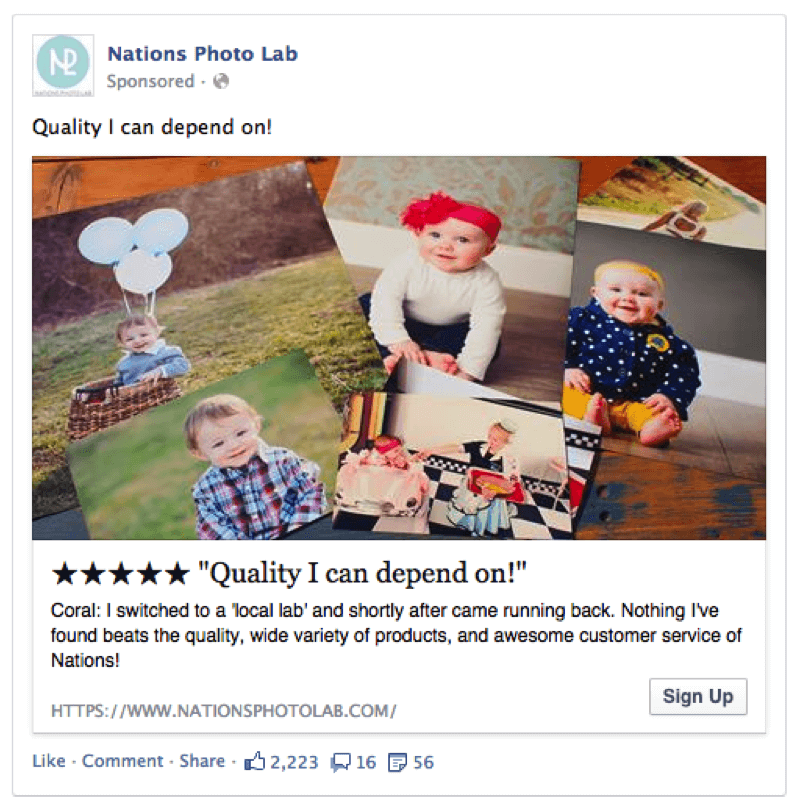It’s hard selling things on Facebook. Facebook isn’t a shopping site. It’s a place for posting pictures of grandchildren, making plans, sharing memes, and connecting with friends. It’s not an online retailer.
That doesn’t mean you can’t sell things on Facebook. You absolutely can. The trick is to join the conversations of your customers, not interrupt them with pitches and sales slogans. If you would like to improve the conversion of your ads and lower the cost per acquisition, add social proof into your Facebook ads.

Table of Contents
The Power of Social Proof
Facebook is a social website. We are social beings. If our friends are doing it, we’re likely to give it a try, too. That’s not just true for the new Italian place down the block but also for shopping habits as well. The trick to making Facebook ads effective is to make sure future customers know how impressed others have been. This is called social proof, and it is highly effective.
Sure, you can tell them about your five star ratings. Or you can show them. And we all know it is far better to show than to tell. So how do you show the Facebook community what their peers are up to? By making customer reviews the focus of your Facebook advertisements.
How to Use Social Proof in Facebook Advertisements
Putting reviews and social proof to work in advertisements can be done in a matter of minutes if you have the necessary elements and accounts. For many businesses, it’s simply a matter of combining assets and accounts in a new way.
Step 1: Acquire Positive Reviews
Happy customers may be less likely to leave reviews than frustrated ones. Use a review management software to reach out to your previous customers, especially your pleased ones, to collect that positive feedback. Once you start to get more reviews, your raw materials are in place.

Step 2: Select the Right Review for the Job
New customers are often drawn in by your most impressive product. Find reviews focusing on your flagship product or service and be sure the review mentions the benefits of the product itself—fast shipping is not as impressive as a product that works perfectly.
Step 3: Find a Classy Story
The best social proof often includes actual proof. This is usually done through storytelling. A review that says “It arrived on time and did what I wanted” isn’t nearly as good as one that includes details.
Something like “I ordered this for my girlfriend’s birthday because I wasn’t sure what to get her. It turns out that it’s perfect for someone who loves books and who is longing to travel.” A story that is well written by a real customer is hugely beneficial. That is the review you want to use.
Step 4: Use Brief Copy
The point of the social proof is to let your customer review do the talking. Your ad copy should be short and to the point. Convey your message in as few words as possible and skip the word “review.” Don’t say pushy things like “Look how much SusieQ loved our new deluxe food processor!” That is too heavy handed to be effective. Consider a message with keywords like “fast delivery,” “free shipping,” and “satisfied customers” and then move out of the way and let the customer say the rest.

Social Proof Provides Influence
Although acquiring endorsements from influential publications has benefits and reach, they’re much more difficult to achieve. Why not utilize your customers? Not only can they be regarded as micro-influencers, but they can also provide social proof. They might not have the same reach as a big publication, but this is a tactic you can return to over and over, building on the influence of their testimonials and reviews, which is often what it takes to turn a consumer into a customer. Consider the influence that reviews have when it comes to Yelp, Amazon, and dozens of other sites, including Facebook. When you harness that influence and include it in your ads, it’s going to have positive results.
Today’s consumer is often distrustful of brands, so the power of an endorsement can be the game changer to help persuade. Many consumers have relied on the advice and recommendations of others for some time to help validate their decisions before making a purchase. Including this type of messaging in Facebook ads helps with that influence.
If you consider some of the types of social proof available (experts, celebrities, customers, connections, certifications), your real opportunity is to leverage advocacy for further reaching distribution. When you start using reviews on Facebook advertisements, you’ll often see more conversions and a boost to your relevance score as engagement improves, giving your ads a higher priority in the Facebook bidding system, which can lower the cost of your ads and customer acquisition. But using reviews also builds trust, something that’s earned, and it’s certain to help your campaigns and advertising on Facebook.
